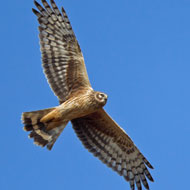Study ‘unlocks potential’ of DNA for wildlife crime

Poisoning, trapping and shooting are all methods used to illegally target birds of prey.
DNA techniques used to solve crime such as burglary and murder could one day be used to identify people involved in wildlife offences, according to new research.
The study, published in the journal Forensic Science International: Genetics, found that human DNA can be traced from wildlife traps that have been outside for at least 10 days. It also found that human DNA can be traced from rabbit baits and bird carcasses at crime scenes after at least 24 hours.
The research was led by the Partnership for Action Against Wildlife Crime (PAW) Scotland in collaboration with the Scottish Police Authority's (SPA) Forensic Services, the Scottish Government and the University of Strathclyde.
“Poisoning, trapping and shooting are all methods used to illegally target birds of prey. However, investigations can often be hampered by a lack of evidence,” said environment secretary Roseanna Cunningham. “This new research will unlock the potential of using DNA profiles to track criminals and could play a crucial role in helping secure convictions for wildlife crime.”
Steven Ferguson, lead forensic scientist at SPA Forensic Services, added: “This exciting research in support of tackling wildlife crime demonstrates that DNA profiles can be obtained from items exposed to the elements in Scotland's sometimes harsh climate.
“In recent years, over £6 million has been invested in new forensic capability in Scotland including DNA24, robotics and powerful software to successfully obtain DNA profiles in support of the Scottish justice system.
“The research undertaken by PAW has demonstrated that these same techniques, used in crimes ranging from housebreaking to murder, can also be used to identify those involved in persecuting birds of prey.”
Detective chief superintendent David McLaren said: "The illegal use of traps are often used in remote places. This makes the collection of evidence extremely challenging. Police Scotland always welcomes advancement in scientific techniques to solve wildlife crime and has always used all the available tools in our pursuit of those who commit wildlife crime.
"This new technique will advance our ability to collect human DNA from illegally set traps."



 The Veterinary Medicines Directorate (VMD) is inviting applications from veterinary students to attend a one-week extramural studies (EMS) placement in July 2026.
The Veterinary Medicines Directorate (VMD) is inviting applications from veterinary students to attend a one-week extramural studies (EMS) placement in July 2026.